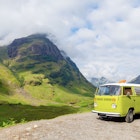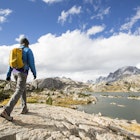

Part of Tongass National Forest, Mendenhall Glacier and Lake are approximately 12 miles from downtown Juneau, Alaska © urbanglimpses / Getty Images / iStockphoto
National parks have long been known as “America’s best idea.”
And while some observers question who really coined the phrase—1972 Pulitzer-winner Wallace Stegner or Edwardian-era diplomat Viscount James Bryce—few take issue with the underlying sentiment. In fact, many wonder why we’re not frantically expanding on our best idea, with The Sierra Club, Earth Island Institute and others calling for more national parklands ASAP.
If Congress were to heed that call, experts say, we could offset everything from the record overcrowding that plagues our most iconic national parks to the biodiversity loss that threatens all manner of habitat. A recent study published in Nature goes so far as to suggest that we could cut land animals’ risk of extinction in half by protecting the world’s remaining wilderness areas.
Lofty goals aside, our continued post-lockdown cravings for wide-open spaces make a new national park especially easy to root for right now. It would be the 64th such designation since Yellowstone kicked off the movement 150 years ago. And while no one can be sure which wilderness area congress will crown next, here are nine worthy contenders.
The best US state parks in each state to visit

Tongass National Forest, Alaska
Overcrowding and biodiversity loss aren’t the only problems that increased parklands might address. If you take potential carbon sequestration benefits into account, as many studies do, new national parks in forested areas could help offset climate change. One prime candidate? The planet’s largest intact temperate rainforest, which also happens to be the country’s largest national forest.
At approximately 26,000 square miles, if the Tongass National Forest were a European nation, it would fall right between Lithuania and Ireland, size-wise. And if this vast confluence of old-growth forests, mountainous archipelagos and Misty Fjords were a national park, the Biden administration’s current efforts to curtail local logging would be strengthened, as would protections for Alaska Native heritage (“Tongass” is actually the name of a local Tlinghit group). That heritage runs deep here, and lives on in everyone from revered storytellers to the next-gen canoe carvers. Don’t miss your own opportunity to hop in a canoe or kayak—these waterways are home to whales, bears and bergs, for starters.
Introducing Alaska’s national parks
Klamath-Siskiyou Forests ecoregion, Oregon and California
Eco-activists and regional tribes have been looking at environmental stewardship initiatives in these ancient forests for ages. One proposal is an Ancient Forest National Park that would run 230 miles from Oregon’s Rogue River to California’s Eel River through one of the world’s most biologically rich temperate coniferous forests. The park in question would protect the legendary biodiversity of the Klamath-Siskiyou Forests ecoregion, home to cougars, bears and one very special weasel, for starters. The waterways are at least as notable, as there are more federally-recognized Wild and Scenic Rivers and waterways here than anywhere else in the continental US.
Perhaps unsurprisingly then, the boating and rafting are epic here. But with four mountain ranges running through the area, so is the hiking and mountain biking. Exploring the vast wilderness, you’ll see why advocates want to upgrade it to a national park, but whatever happens with those efforts, the area has already made the World Wild Life Fund’s Global 200 list of “the most outstanding and representative habitats for biodiversity on this planet” for purposes of conservation.
The 25 best hikes in Oregon past mountains, waterfalls and dunes

Chiricahua National Monument, Arizona
Taking its name from the ancient Opata word for “wild turkey,” the Chiricahua National Monument is still home to the Gould’s Turkey—a formerly at-risk subspecies turned conservation success story. Key to the comeback: a local hunting ban, plus the sheer isolation of the birds’ mountain aeries mid-desert (“sky islands,” in the parlance of these US-Mexico borderlands). Still, for all the fascinating wildlife—which also includes javelina and coatimundi—the geologic formations are the real, well…rock stars.
Born of volcanism, sculpted by the elements and starkly arrayed along the park’s 17 miles of hiking trails, these super-sized rhyolite pillars look like the handiwork of some cairn-obsessed deity—though the reigning Chiricahua Apache god, Usen, is better known for giving rise to the entire universe. Because this landscape remains sacred, one of the congressional bills proposing its re-designation as a national park advises the Secretary of the Interior “in consultation with Indian Tribes, to ensure the protection of, and access to, traditional cultural and religious sites.” Separately, a senate bill to make this land a national park passed unanimously at the end of March. To toast to the good news after you’ve explored the area, visit a neighboring Wilcox winery. Yes, there’s an actual wine region in the Arizona desert—and even more surprising to the uninitiated, numerous varietals have won national awards.
Introducing Arizona’s national parks and monuments
Northwoods, Michigan and Wisconsin
If the Sierra Club’s proposed North Woods National Park came to pass, the resulting park would be the Midwest’s largest. Made up of vast, carbon-dense tracts such as the Chequamegon-Nicolet National Forest—plus glacial lakes, wild rivers and wetlands—the total acreage would be three million.
There you may spot not only imperiled species—harbor wolves, lynx and osprey, for starters—but also fellow humans: paddlers, hikers, mountain bikers, anglers and in winter, cross-country skiers. And while snowmobile use in national parks is constantly being reviewed, the current iteration of the Northwoods is such a beloved snowmobiling destination there’s even a Snowmobiling Hall of Fame and Museum in the town of St. Germain, Michigan.
9 of the best scenic hikes in Michigan

Katahdin Woods and Waters National Monument, Maine
Though Maine is home to at least a couple of potential new national parks, Katahdin Woods and Waters National Monument was recently called out by the chair of the senate subcommittee on National Parks—none other than Maine’s own Angus King—as a likely candidate. The state’s tallest mountain, the nearly mile-high Mount Katahdin, serves as a backdrop to these 87,000 wooded acres, where multiple rivers and streams interlace a landscape of forests and wetlands.
As befits a place with the word “Waters” in its name, the kayaking and canoeing ops are plentiful and beautiful here, but the hiking and mountain biking trails are epic, too. Or simply stock up on homemade blueberry and whoopie pies at Katahdin General Store and drive along the monument’s 17-mile scenic loop, where you’ll find plenty of scenic overlooks. Sightings that may include moose, lynx, black bears or other famed residents.
10 breathtaking hikes in Maine

Delaware Water Gap National Recreation Area, New Jersey/Pennsylvania
Despite its name, the Delaware Water Gap straddles New Jersey and Pennsylvania and stands to become the first national park in both states. At around 67,000 acres, the current National Recreation Area is home to 150 miles of leafy Pocono Mountain trails, a 40-mile stretch of the Delaware River and a whole series of waterfalls. Don’t miss Raymondskill Falls, whose three-tiered drop almost adds up to the height of Niagara—or Dingmans Falls, where you’ll hike along a boardwalk to the lower section, then do a more rugged climb for views of the upper falls.
Among those advocating for national park status here, it’s not just about preserving bucolic beauty. Some see this as a social justice issue, too, given how few national parks are withing easy reach of millions of New Jersey, Pennsylvania and New York City dwellers. The access provided by a new Delaware Water Gap National Park would start to turn those tides.
15 unmissable things to do in New Jersey

Craters of the Moon National Monument & Preserve, Idaho
While the American West is far more endowed with national parks than the east, there’s one state in the region that comes up short: Idaho. Granted, Yellowstone spills over the border from Wyoming, so if you’re going to lay claim to only some of a national park, a sliver of the granddaddy of them all isn’t bad. But among those who believe Idaho should have its own national park, Craters of the Moon is a top contender, especially if the footprint were expanded to include the neighboring sagebrush steppe—home to the at-risk sage grouse and rich, carbon-storing soil.
But the centerpiece of the park would be the namesake lunar landscapes, all formed by ancient volcanic activity. You’ll find views for days, especially atop the Inferno Cone, where you’ll see the Great Rift, the Snake River Plain, the Pioneer Mountains and if you’re lucky, the Tetons. One rival panorama? The view you’ll get of the legendary local night sky from the Lava Flow Campground.
These Idaho mountain towns are perfect for outdoor vacations

Ocmulgee Mounds National Historical Park, Georgia
Georgia is another state that doesn’t yet have its own national park, but once the National Park Service wraps up a special resource study of the Ocmulgee River Corridor between Macon and Hawkinsville, things may change. The potential park has been a longtime goal of local conservationists and the Muscogee (Creek) Nation, whose displaced ancestors once called these lands home. Actually, there are thousands of years’ worth of Indigenous history in the area, as you’ll find at the Ocmulgee Mounds National Historical Park—once the scene of the largest archeological dig in the US You’ll want to wander the entire site, but at a minimum, see The Great Temple Mound Complex, the most imposing remnants of the Mississippians who lived here in the 10th century.
The prospective national park would fuse the archeological park and riverside stretch into a new mega-park that could run for almost 60 miles through 70,000 or so acres of environmentally and culturally significant lands—all within easy reach of downtown Macon. Needless to say, you won’t want for amazing refueling stops in town, but two of the most iconic are Fish n’ Pig and the Bear’s Den.
12 great things to do in Macon, Georgia: celebrate this music-loving small town
Big Bend, Florida
Yes, the US already has a Big Bend National Park in Texas. But advocates of a Floridian counterpart along the state’s panhandle say we need to protect the longest stretch of undeveloped (and barely developed) coastline in the lower 48. If a proposed 1.9 million-acre Florida Big Bend National Park comes to pass, it will also include forests, wetlands, rivers, springs, estuaries and a major swath of seagrass—an essential habitat, erosion mitigator, food source and “blue carbon” storehouse. Among the region’s most famous and imperiled residents are manatees, but you may also encounter leopard frogs, grey wolves and all manner of bird in your explorations by boat, bike or foot.
Indeed, the area’s 83,000-acre St. Marks National Wildlife Refuge was designated an avian habitat almost a century ago and has since been home to not only bald eagles, osprey, woodpeckers and huge numbers of seabirds—but also alligators, deer and monarch butterflies. If these last winged are your thing, visit in October, when monarchs, Viceroy, Queen, American Painted Beauty and Gulf Fritillary butterflies will set your heart aflutter.
Explore related stories






 ShoppingJackson Hole in 5 shops: Western wear, gourmet provisions and more
ShoppingJackson Hole in 5 shops: Western wear, gourmet provisions and moreNov 17, 2024 • 4 min read

 CyclingFrom the Highlands to the islands, here’s how to get around Scotland
CyclingFrom the Highlands to the islands, here’s how to get around ScotlandOct 15, 2024 • 9 min read










